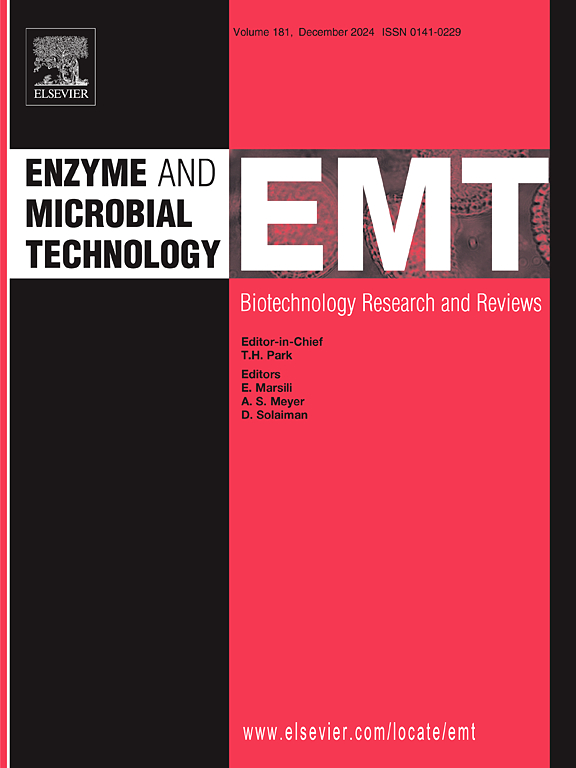Selective transformation of crocin-1 to crocetin-glucosyl esters by β-glucosidase (Lf18920) from Leifsonia sp. ZF2019: Insights from molecular docking and point mutations
IF 3.4
3区 生物学
Q2 BIOTECHNOLOGY & APPLIED MICROBIOLOGY
引用次数: 0
Abstract
Crocetin di/mono-glucosyl esters (crocin-4 and crocin-5) are rarely distributed in nature, limiting their potential applications in the food and pharmaceutical industries. In the present study, a novel GH3 family β-glucosidase Lf18920 was identified from Leifsonia sp. ZF2019, which selectively hydrolyzed crocin-1 (crocetin di-gentiobiosyl ester) to crocin-5 and crocin-4, but not to its aglycone, crocetin. Under the optimal condition of 40 °C and pH 6.0 for 120 min, Lf18920 almost completely hydrolyzed crocin-1, yielding 73.50±5.66 % crocin-4 and 16.19±1.38 % crocin-5. Molecular docking and point mutation studies revealed that Lf18920 formed a narrow binding channel that facilitated crocin-1 binding. Five single amino acid variants (D50A, D53A, W274A, G420A, and Q421A) were constructed, all of which showed reduced hydrolytic activity. Mutations at D50 and D53, located distal to the active site, increased binding energy and decreased hydrolytic activity, while mutations at W274, G420, and Q421, proximal to the active site, disrupted hydrolytic function. These findings suggest that the narrow binding channel and specific enzyme-substrate interactions are crucial for Lf18920’s selective hydrolytic activity. Overall, this study is the first to report a β-glucosidase capable of selectively transforming crocin-1 to crocetin di/mono-glucosyl esters, offering potential for synthesizing crocin-4 and crocin-5.
来自 Leifsonia sp. ZF2019 的 β-葡萄糖苷酶 (Lf18920) 将 crocin-1 选择性转化为鳄梨素-葡萄糖基酯:分子对接和点突变的启示。
鳄梨素二/单葡萄糖基酯(鳄梨素-4 和鳄梨素-5)在自然界中很少分布,限制了其在食品和制药业中的潜在应用。本研究从 Leifsonia sp. ZF2019 中发现了一种新型 GH3 家族 β-葡萄糖苷酶 Lf18920,它能选择性地将 crocin-1(藏红花素二-胍基酯)水解为 crocin-5 和 crocin-4,但不能水解为其苷元藏红花素。在 40 °C、pH 值为 6.0 的最佳条件下,持续 120 分钟,Lf18920 几乎完全水解了 crocin-1,得到 73.50±5.66 % 的 crocin-4 和 16.19±1.38 % 的 crocin-5。分子对接和点突变研究表明,Lf18920 形成了一个狭窄的结合通道,有利于与 crocin-1 结合。研究人员构建了五个单氨基酸变体(D50A、D53A、W274A、G420A 和 Q421A),所有这些变体的水解活性都有所降低。位于活性位点远端的 D50 和 D53 突变增加了结合能,降低了水解活性,而位于活性位点近端的 W274、G420 和 Q421 突变则破坏了水解功能。这些发现表明,狭窄的结合通道和特定的酶-底物相互作用对 Lf18920 的选择性水解活性至关重要。总之,这项研究首次报道了一种能选择性地将 crocin-1 转化为 crocin 二/单葡萄糖基酯的β-葡萄糖苷酶,为合成 crocin-4 和 crocin-5 提供了潜力。
本文章由计算机程序翻译,如有差异,请以英文原文为准。
求助全文
约1分钟内获得全文
求助全文
来源期刊

Enzyme and Microbial Technology
生物-生物工程与应用微生物
CiteScore
7.60
自引率
5.90%
发文量
142
审稿时长
38 days
期刊介绍:
Enzyme and Microbial Technology is an international, peer-reviewed journal publishing original research and reviews, of biotechnological significance and novelty, on basic and applied aspects of the science and technology of processes involving the use of enzymes, micro-organisms, animal cells and plant cells.
We especially encourage submissions on:
Biocatalysis and the use of Directed Evolution in Synthetic Biology and Biotechnology
Biotechnological Production of New Bioactive Molecules, Biomaterials, Biopharmaceuticals, and Biofuels
New Imaging Techniques and Biosensors, especially as applicable to Healthcare and Systems Biology
New Biotechnological Approaches in Genomics, Proteomics and Metabolomics
Metabolic Engineering, Biomolecular Engineering and Nanobiotechnology
Manuscripts which report isolation, purification, immobilization or utilization of organisms or enzymes which are already well-described in the literature are not suitable for publication in EMT, unless their primary purpose is to report significant new findings or approaches which are of broad biotechnological importance. Similarly, manuscripts which report optimization studies on well-established processes are inappropriate. EMT does not accept papers dealing with mathematical modeling unless they report significant, new experimental data.
 求助内容:
求助内容: 应助结果提醒方式:
应助结果提醒方式:


